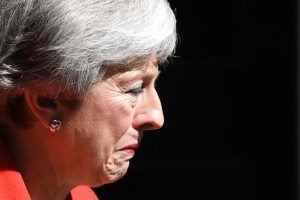Lara Spirit is co-president of Our Future Our Choice, a group of young people campaigning for a second referendum on Brexit.
LONDON — It might seem peculiar that only 160,000 people will choose Britain’s next prime minister. The population of the country is 66 million. Peculiar and potentially infuriating. But following the resignation of Prime Minister Theresa May last week, it became inevitable that our next leader would be chosen by a ballot of a small “selectorate” of Conservative party members that make up less than half a percent of the population of the country.
At first glance, last week was a welcome break to the deadlock. The prime minister’s flagship Brexit deal, with minor tweaks from previously proposed versions, was publicly rejected by dozens of members of her party before it even came to a vote. May then announced her resignation, and the very next day, the European Parliament elections obliterated Britain’s two main parties in one fell swoop. Together, they achieved less than 25 percent of the vote.
For moderate Conservatives in any doubt, the European election proved a sobering reminder of how out of step their leaders are with public opinion. The party hemorrhaged voters to Nigel Farage’s new Brexit Party. It was the Conservatives’ worst electoral result since 1832.
Crashing out of Europe without a deal was never mentioned by even the most euroskeptic politicians in 2016 — official “Leave” leaflets promised back then to negotiate prior to our departure. Boris Johnson, in the immediate aftermath of the 2016 referendum, wrote that “there will continue to be free trade and access to the single market,” rejecting the notion we’d be extricating ourselves completely from European Union institutions. And for good reason: generous estimates put the GDP cost of a no deal departure (leaving the E.U. on October 31 without any agreement in place) at 8 percent — worse than the 2008 recession.
But despite the triumph of Farage’s Brexit Party in the European election, the country at large is resolutely opposed to a no deal exit: 40 percent of voters opted for explicitly anti-Brexit parties in the European elections, versus 35 percent who supported parties advocating leaving without a deal. And yet, to ingratiate themselves with Conservative voters, candidates must at the very least be sanguine and at best enthusiastic about this eventuality.
So the “beauty parade for hard Brexiteers,” as Justine Greening, the Remain-supporting education secretary, put it, will continue through the summer. Their successor will likely, but far from inevitably, be Boris Johnson, the divisive Old Etonian who is seen as a Brexit purist at the grassroots level, having campaigned for Leave in the referendum and subsequently resigned his position as May’s foreign secretary in protest of her compromise deal.
Whatever type of Brexit this new leader favors will need the consent of the people themselves through a second referendum. To reach that realization, the fantasies indulged by candidates for prime minister must come to an end. No new leader will be able to persuade Brussels to reopen and renegotiate the withdrawal agreement, but all claim they can. No prime minister will be able to find the votes for no deal, when 400 members voted against it (only 160 for it) in the House of Commons in March. No prime minister will be able to find the votes for a compromise deal, when previous attempts in this direction were defeated three times by historic margins. And no prime minister from the Conservative party will be able to call a general election and hope to secure a majority for any deal, when the party just suffered its worst defeat in a national election in nearly 200 years.
Here is the only real change from the week of turmoil. Previously, a general election and new referendum were seen by some as interchangeable solutions to the crisis. In the wake of a vote share in the single digits last weekend, no new Conservative leader would call a general election should he or she wish to remain in the governing party. And after its own poor performance, no Labour government would likely seek one either.
This means whoever Britain’s new leader will be will face the same parliamentary arithmetic as the last. There’s no majority in Parliament for leaving without a deal, nor has one been found for any particular deal.
So buckle up for another summer devoid of common sense, with the vast majority of Britain relegated to speculating about the election of our next leader. The delusions of these hard Brexiteers will eventually come to a head in October, when whoever is chosen must face the hard truth that sealed May’s fate. Until the country as a whole is consulted in a referendum, the constitutional crisis that has engulfed British politics for the last three years will not end.




